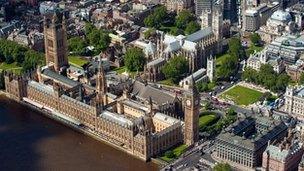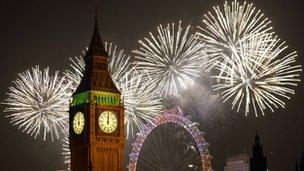Building for the future
- Published
- comments
It's not often I find myself disagreeing with Matt Flinders, the formidable chair of the Political Studies Association, but when he writes that Parliament should abandon the Palace of Westminster and move to a new purpose-built home, external, I really, really, do disagree.
The British Parliament meets in one of the four or five most recognisable buildings on the planet, on a site which has been the heart of national life since before the Norman Conquest.

Move? From here?
To be sure it was designed as the home of a pre-democratic parliament, and is festooned with feudal iconography, and it's clearly in urgent need of extremely expensive refurbishment.
But it's also the place where Parliament put a King on trial, where Wilberforce pushed for the abolition of slavery, where the vote was progressively extended, where Churchill roared defiance at Hitler, Bevan launched the NHS and Thatcher told MPs the Falklands were British, external.
History oozes from every nook and cranny. And I instinctively loathe the idea of cutting the current generation of politicians off from the centuries of parliamentary history example and inspiration behind them. Matt disagrees. He argues Victorian Westminster is wrong for a 21st Century democracy. Turning Churchill's famous dictum: "We shape our buildings and afterwards our buildings shape us," he adds: "Maybe this is the problem."
Hmmm. There's half an argument there. I don't see much evidence of feudal forehead knuckling in the Commons, even if MPs occasionally walk past murals of the regal past.
On the other had, it is interesting that Portcullis House, the relatively new parliamentary office block has created an open non-hierarchical space where MPs, peers, researchers, clerks, hacks and visitors all mingle, and a lot of denizens of the parliamentary estate seem to enjoy it. The Victorian section of the parliamentary buildings is full of MPs-only, or peers-only, or "visitors-only-when-accompanied" bars and dining rooms, and maybe that does encourage the parliamentarians to see themselves as an elite caste.
So do we need some new glass and steel edifice designed by m'lords Rogers or Foster to remedy that? No, we don't. The parliamentary buildings are going to need to have massive amounts spent on them in the near-ish future, whether the building remains a parliament or becomes, as Matt Flinders suggests, a museum. They're a world heritage site and can never be allowed to fall or burn down.
So the refurbishment cost is not a central issue.
Should there be a chamber with seats for all the members? Perhaps with computer ports to facilitate the vital parliamentary pastime of Candy Crush Saga...
A lot of more modern debating chambers are rather antiseptic by comparison to the Commons. The electric atmosphere of a great Commons occasion is an extraordinary thing to experience, and would probably not be reproducible in a less intimate, more spacious setting.

Fireworks are frequently experienced - inside the building...
But the refurbishment is indeed an opportunity to re-imagine parliament for the 21st Century...and that might entail opening it up more, and designing in more opportunities for public access to and participation in the work of Parliament. It would be a missed opportunity if the whole exercise was reduced to rewiring and new window frames.
My pet scheme is to create a Parliamentary Museum under a British Museum-style glass roof in the rarely-visited quadrangle next to St Stephens Hall. Not only would this give the public a chance to enjoy one of Westminster's hidden architectural glories, but it would also provide a convenient space in which to display all manner of parliamentary treasures - the death warrant of Charles I, for example.
This kind of reinvention can be done without a new building and therefore without losing that historic connection. With all its current faults and dilapidations, the building as it is now reminds MPs and peers that they are part of a living history.
And that should never, never, never be lost.